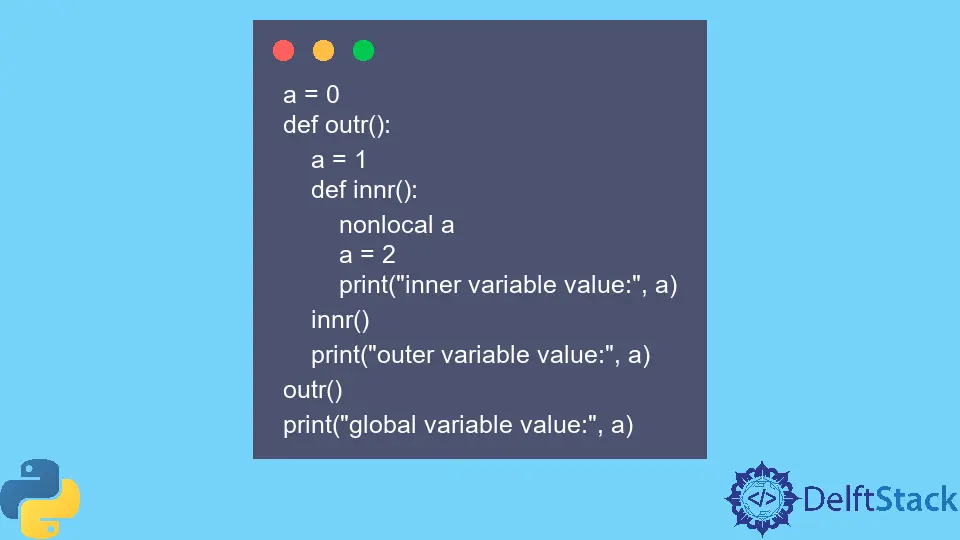The nonlocal Keyword in Python
- Understanding the Nonlocal Keyword
- Using Nonlocal in Nested Functions
- Practical Applications of Nonlocal
- Nonlocal vs Global Keyword
- Conclusion
- FAQ

When diving into the world of Python programming, understanding the scope of variables is crucial. One of the often-overlooked keywords that can significantly enhance your coding experience is the nonlocal keyword. This powerful feature allows you to work with variables that are not in the local or global scope, especially when dealing with nested functions.
In this tutorial, we’ll explore the nonlocal keyword in Python, its importance, and how to effectively use it in your code. Whether you’re a beginner or an experienced developer, grasping the concept of nonlocal variables will undoubtedly improve your coding skills and help you write cleaner, more efficient code.
Understanding the Nonlocal Keyword
To grasp the nonlocal keyword, it’s essential to understand variable scope in Python. In Python, variables can exist in three primary scopes: local, global, and nonlocal. Local variables are defined within a function and can only be accessed there. Global variables are defined outside of any function and can be accessed from anywhere in the code. Nonlocal variables, on the other hand, are defined in an enclosing function and can be accessed by nested functions.
The nonlocal keyword allows you to modify a variable in an enclosing scope, which is particularly useful in situations where you want to maintain state across multiple function calls. Let’s look at an example to clarify this concept.
Using Nonlocal in Nested Functions
Consider a scenario where you have a nested function that needs to modify a variable defined in its enclosing function. Without the nonlocal keyword, trying to modify that variable would result in a UnboundLocalError. Here’s how you can use the nonlocal keyword to achieve this.
def outer_function():
count = 0
def inner_function():
nonlocal count
count += 1
return count
return inner_function
increment = outer_function()
print(increment())
print(increment())
Output:
1
2
In this example, the outer_function defines a variable count initialized to zero. The inner_function, which is nested within outer_function, uses the nonlocal keyword to indicate that it wants to modify the count variable from the outer scope. Each time increment() is called, it increments count and returns the new value. This demonstrates how nonlocal variables can maintain state across function calls.
Practical Applications of Nonlocal
The nonlocal keyword is particularly useful when dealing with closures. A closure is a function that retains access to its enclosing scope even when the function is executed outside that scope. This characteristic can be beneficial in various scenarios, such as creating decorators or managing state in a callback function.
Here’s an example that illustrates the practical application of nonlocal in a closure:
def make_counter():
count = 0
def counter():
nonlocal count
count += 1
return count
return counter
my_counter = make_counter()
print(my_counter())
print(my_counter())
print(my_counter())
Output:
1
2
3
In this example, the make_counter function returns a counter function that increments and returns the count variable. By using nonlocal, we ensure that the count variable retains its value across multiple calls to my_counter. This creates a simple counter that can be used anywhere in your code, showcasing the power of closures and the nonlocal keyword.
Nonlocal vs Global Keyword
While both the nonlocal and global keywords deal with variable scope, they serve different purposes. The global keyword is used to modify a variable defined at the top level of a script or module, making it accessible across all functions. In contrast, nonlocal is specifically used for variables in an enclosing scope that are not global.
Let’s delve into an example that highlights the difference between the two keywords:
count = 0
def global_counter():
global count
count += 1
return count
def nonlocal_counter():
count = 0
def inner():
nonlocal count
count += 1
return count
return inner
print(global_counter())
print(global_counter())
my_nonlocal_counter = nonlocal_counter()
print(my_nonlocal_counter())
print(my_nonlocal_counter())
Output:
1
2
1
2
In this example, the global_counter function modifies the global variable count, while the nonlocal_counter function uses the nonlocal keyword to modify a variable defined in its enclosing scope. This distinction is crucial for understanding how variable scope works in Python and when to use each keyword effectively.
Conclusion
The nonlocal keyword in Python is a powerful tool for managing variable scope, especially in nested functions. By allowing you to modify variables from an enclosing scope, it opens up new possibilities for writing clean, efficient, and maintainable code. Whether you’re creating closures, managing state, or designing decorators, understanding how to use nonlocal will undoubtedly enhance your programming skills. As you continue to explore Python, keep this keyword in mind, and experiment with it in your projects to see the benefits firsthand.
FAQ
-
What is the purpose of the nonlocal keyword in Python?
The nonlocal keyword allows you to modify a variable in an enclosing scope within nested functions. -
How does nonlocal differ from global in Python?
Nonlocal is used for variables in an enclosing scope, while global is used for variables defined at the top level of a script or module. -
Can I use nonlocal with global variables?
No, the nonlocal keyword cannot modify global variables; it is specifically for variables in enclosing scopes. -
When should I use nonlocal in my code?
Use nonlocal when you need to maintain state across multiple calls to a nested function without using global variables. -
Is nonlocal supported in Python 2?
No, the nonlocal keyword was introduced in Python 3, so it is not available in Python 2.
Vaibhhav is an IT professional who has a strong-hold in Python programming and various projects under his belt. He has an eagerness to discover new things and is a quick learner.
LinkedIn